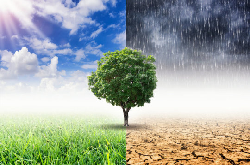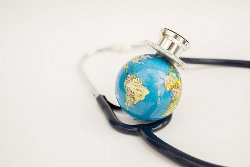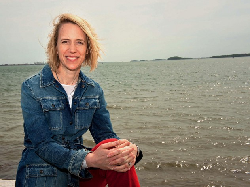July 2018 Sustainable Development
Read the articles selected in July 2018
Atlas of Sustainable Development Goals 2018
Source: World Bank
This report is a map which tells the progress of the 17 SDGs in the world, drawing on the World Development Indicators, with the intent to make them understandable and evident, facilitating decision-making and accountability.
The ICLEI Montréal commitment and strategic vision 2018-2024
Source: https://worldcongress2018.iclei.org

ICLEI is a group of cities which has embedded sustainable development in all aspects of urban life, to create healthy, livable and inclusive communities whose activities take place in climate neutrality and where circular and resilient development is promoted.
The seasonal fingerprint of climate change
By William J. Randel
Source: Science, 20 July
This paper shows how the anthropogenic factor influences not only the global climate but also local and seasonal changes. As it is of crucial importance the function of satellite data sets, so the regional and seasonal patterns are useful for improving climate models.
Extreme heat linked with reduced cognitive performance among young adults in non-air-conditioned building
Source: https://green.harvard.edu/

A study published in PLOS Medicine shows that extreme heat affects not only the very young or elderly population but also young adults. Differently from other epidemiologic studies, this research is based on indoor temperatures, that have a particular impact on the cognitive performances.
Read more:
La “pilule antisida” confirme son efficacité
By Cécile Thibert
Source: Le Figaro, 25 July
The 22th Conference on the AIDS taking place in Amsterdam has presented the data that confirm the efficacy of the anti-HIV pill, a prevention’s drug tested in France among people at risk, which doesn’t work against other sexually transmitted diseases.
Scientists are key to making cities sustainable
By Mark Fischetti
Source: Scientific American, 16 July
Sustainability is not a faith statement, but an issue of science, technology, and innovation. So scientists should be part of the cities’ administration, to prevent disasters and deaths, but also to improve the economy, traffic and crime prevention.
Read more:
https://www.scientificamerican.com/article/scientists-are-key-to-making-cities-sustainable/
Multi-stakeholder partnerships
Source: http://www.fao.org

Although multi-stakeholder partnerships are not the final solution to the problem of hunger and malnutrition, they are a key tool to achieve the SDGs, so that the 2030 Agenda includes them as an autonomous goal. This report highlights the benefits and limitation of MSPs, as a contribution to the role of States in eradicating hunger.
Read more:
http://www.fao.org/fileadmin/user_upload/hlpe/hlpe_documents/HLPE_Reports/HLPE-Report-13_EN.pdf
Global warming may be twice what climate models predict
Source: https://www.sciencedaily.com, 5 July

A research published in Nature Geoscience and based on past observations shows that current climate projections underestimate long-term warming. Once the climate has stabilized, the Arctic regions could collapse with cascade effects on all ecosystems, and the global temperature could be twice as usually represented.
Read more:
https://www.sciencedaily.com/releases/2018/07/180705110027.htm
Gina Moseley erkundet arktische Höhlen
By Alois Pumhösel
Source: Der Standard, 18 July
The stalagmites and stalactites of the caverns hidden under Greenland’s ice build a data archive of the climate phases the Earth has gone through along millions of years, to build a mosaic of local and global phenomena through which we can better understand climate change.
Nelson Mandela Day International Day 18 July
Source: http://www.un.org

In the Nelson Mandela International Day 2018, the centenary of his birth, the United Nations commemorate a man who fought with his example through all his life for an ideal of peace and freedom, as the unique existence condition for the human rights and the democracy.
Read more:
http://www.un.org/en/events/mandeladay/assets/pdf/mandela-exhibit-panels.pdf
OECD-FAO Agricultural Outlook
Source: asvis.it

In the last years, the weakened demand for agricultural commodities, despite the global population growth, doesn’t correspond to the growth of production, achieved through the intensification and expansion of croplands. The new international trade policies are increasing the uncertainties about agricultural markets.
Read more:
UN Climate Change. Annual Report 2017
Fonte: https://unfccc.int
The UN Climate Change is the UN body with the task to support negotiations, fostering an environment of transparency and trust about the commitments of countries on climate and helping the most vulnerable communities to address the consequences of global warming.
Read more:
https://unfccc.int/resource/annualreport/
Changing places
Fonte: https://green.harvard.edu/
If climate change causes mass migration into urban areas, these areas are the places more exposed to the consequences of climate change on human health. If the cities are not able to solve this problem, this is not likely to be solved at all. A first step is to address climate change as an issue of public health.
Read more:
https://www.hsph.harvard.edu/magazine/magazine_article/changing-places/
Family planning is a human right
di Natalia Kanem
Fonte: https://www.unfpa.org, 6 Luglio
Family planning is crucial for women empowerment and to fight poverty cycles. In the World Population Day, the United Nations calls on countries to strengthening national health systems to ensure a modern contraception and promote gender equality.
Read more:
https://www.unfpa.org/press/family-planning-human-right
New HIV vaccine shows promise after clinical trials
di Tom Barnes
Fonte: The Independent, 8 Luglio

A study published in The Lancet presents the first results of a trial on humans of an HIV vaccine. After the success of the first test, the drug is now being tested on a group of 2600 women in Subsaharan Africa, but scientists are cautiously on this point.
UN launches new coalition on health, environment and climate change
Source: asvis.it

2.6 million people die every year because of climate change and air pollution. Global concentrations of CO2 are directly linked with Earth temperatures, triggering a chain of economic damage and natural disasters. It is urgent to implement the Paris Agreement to keep the temperature increase below 2C.
Read more:
http://ec.europa.eu/environment/marine/international-cooperation/pdf/2018_UNEP_EU_roadmap.pdf
Biodiversity, Land Use and Ecosystems. What’s happening 2017 and 2018
Source: http://www.oecd.org
This link provides a forum where are collected the experiences of OECD countries in the conservation and sustainable use of biodiversity, within a project which intends to mainstream biodiversity in the agriculture and fishery as an element which distinguishes a sustainable development.
Read more:
Tourism for Development
Source: https://www.e-unwto.org
This report shows how tourism can contribute to achieving the sustainable development, by fostering economic growth, nature’s protection and the safeguard of cultural heritage. But it is also a challenge, because it requires a change in consumer’s behaviours.
Read more:
https://www.e-unwto.org/doi/pdf/10.18111/9789284419722
L’étude sur la nocivité des OGM était une manipulation
By Cécile Thibert
Source: Le Figaro, 4 July
A study on the potential risks of OGM for human and animal health, commissioned by the European Commission with the project G-TwYST, has ended up proving wrong the data and methods of a previous experiment on rats that had developed a high rate of tumors.
Parliaments and the Sustainable Development Goals
Source: https://www.ipu.org/
Parliaments have a key role in the achievement of the SDGs. National laws translate the objectives of the 2030 Agenda in specific and local needs. Furthermore, Parliaments are expected to control that legislative acts of their governments are in line with the human rights and the principles of the 2030 Agenda.
Read more:
file:///C:/Users/Roberta%20Capo/Downloads/en-_sdg-toolkit-web_1.pdf
Building back better
By Stephane Hallegatte, Jun Rentschler, Brian Walsh
Source: GFDRR & World Bank

In the countries more exposed to extreme climate events, building back is a need to return to normality, but it is also an opportunity to edify a society more inclusive and resilient to shocks at large scale. A guide to being used by the rest of the world.
Read more:
https://openknowledge.worldbank.org/bitstream/handle/10986/29867/127215.pdf?sequence=1&isAllowed=y
More active people for a healthier world
Source: World Health Organization

A regular physical activity not only lowers the risk of not communicable diseases but also has positive economic and social effects across a wide range of SDGs. This report proposes a set of actions to reduce inequalities in this universal right, which helps to make the world better.
Read more:
http://apps.who.int/iris/bitstream/handle/10665/272722/9789241514187-eng.pdf
Convention against torture and other cruel, inhuman or degrading treatment or punishment
Source: http://www.un.org

The prohibition of torture is part of the customary international law, which applies it also to the not Party States. In the Party States, each act against the human dignity is under the criminal law and is complained before a judge without any justification. The statements obtained through torture can’t be used as evidence.
Read more:
https://www.ohchr.org/Documents/ProfessionalInterest/cat.pdf
Judge accepts climate science, but tosses suits against oil companies
By Anne C. Mulkern
Source: Scientific American, 26 June

A federal ruling in California has recognized for the first time the causal link between the consumption of fossil fuels and the climate change by dismissing a case brought by two cities against five oil companies, due to the worldwide reach of the alleged wrong and the political nature of the problem.
Read more:
The “Global Chemical Experiment”
By Courtney Humphries
Source: https://green.harvard.edu/

The planetary-scale processes triggered by human activities are not easy to understand and evaluate. The work of Elsie Sunderland from Harvard’s University sheds light on the effects of our chemical civilization on the ecosystems and the human health.
Read more:
https://www.harvardmagazine.com/2018/07/elsie-sunderland-harvard
Info
- Pubblicato il : 10/09/2018 Modificato il : 04/04/2019
Allegati
- La “pilule antisida” confirme son efficacité pdf
- The seasonal fingerprint of climate change pdf
- The ICLEI Montréal commitment and strategic vision 2018-2024 pdf
- Atlas of Sustainable Development Goals 2018 pdf
- Gina Moseley erkundet arktische Höhlen pdf
- New HIV vaccine shows promise after clinical trials pdf
- L'étude sur la nocivité des OGM était une manipulation pdf

